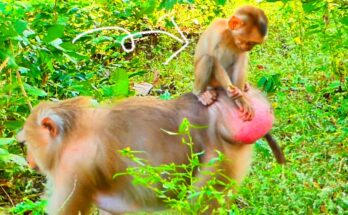Feeding milk to newborn baby monkeys is a delicate and highly important task that requires proper knowledge, care, and attention. Newborn monkeys, like human infants, depend entirely on milk for nutrition during the first weeks or months of life. However, feeding them is not as simple as offering cow’s milk or formula meant for human babies. Baby monkeys have specific nutritional needs, and the wrong kind of milk can lead to serious health problems.
In the wild, newborn monkeys rely on their mother’s milk, which is naturally designed to support their growth, immune system, and digestive health. When caring for an orphaned or rescued baby monkey, the primary goal is to mimic the mother’s milk as closely as possible. Specialized primate milk formulas are usually recommended because they contain the appropriate balance of proteins, fats, and vitamins. Using cow’s milk is generally discouraged, as it can cause diarrhea, malnutrition, or digestive discomfort due to its different nutritional composition.
Feeding technique also plays a major role in keeping a baby monkey healthy. Typically, a small nursing bottle with an appropriate nipple size is used. The caregiver must hold the monkey in a natural, upright nursing position to prevent choking or milk entering the lungs. Feeding should be done slowly and gently, allowing the baby to drink at its own pace. Overfeeding or feeding too quickly can cause bloating, aspiration, or other digestive issues.
Newborn monkeys must be fed frequently—sometimes every two to three hours, including during the night. Their tiny stomachs cannot hold much milk at once, so regular feeding ensures they receive enough nutrients. Additionally, after each feeding, the caregiver must stimulate the baby monkey to urinate and defecate, mimicking the behavior of a mother monkey who would naturally lick her infant to trigger these functions.
Cleanliness is crucial. Bottles, nipples, and feeding areas must be sterilized to prevent infections, as newborn monkeys have fragile immune systems. Any signs of discomfort, diarrhea, dehydration, or refusal to eat should be taken seriously, as they may indicate health problems requiring veterinary attention.


